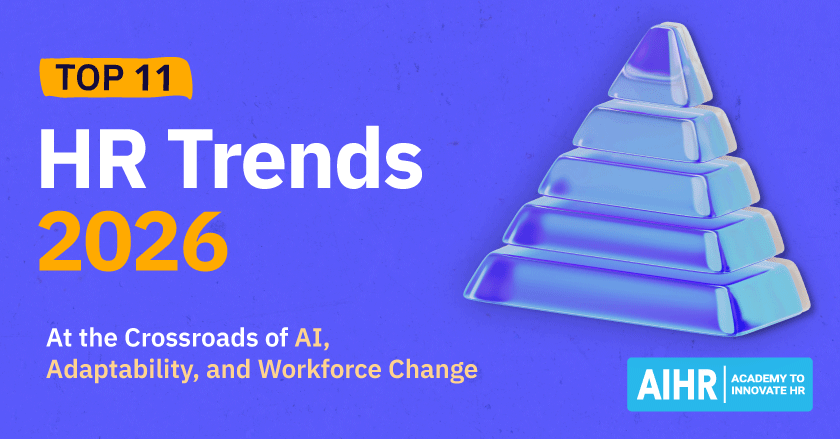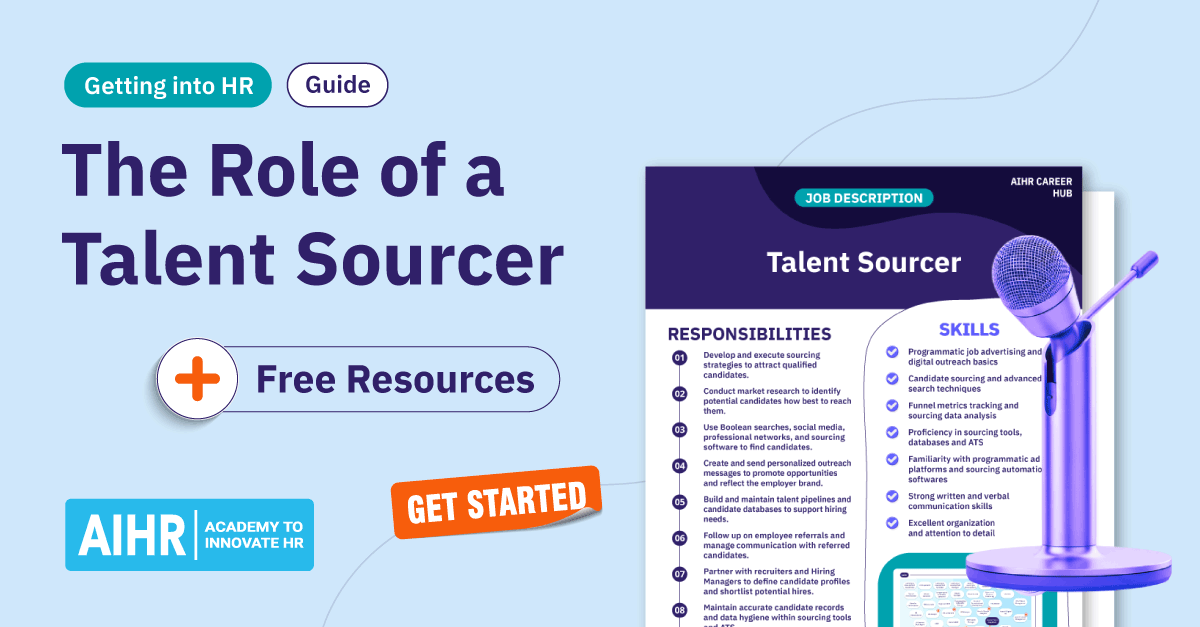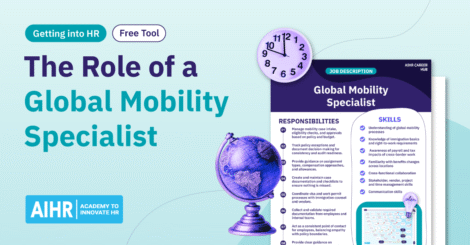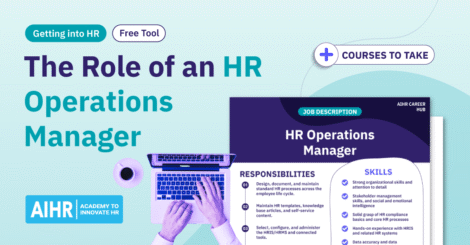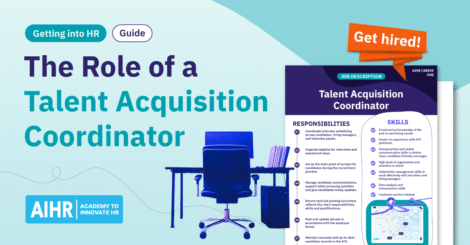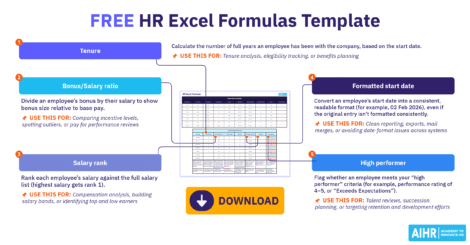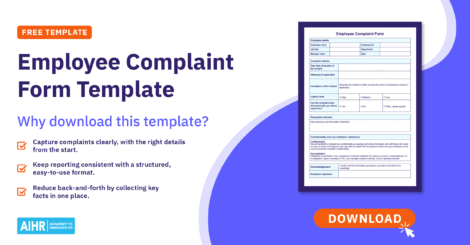A Talent Sourcer helps companies grow and compete by finding the right people fast. 72% of HR professionals cite talent gaps as their top challenge, and Talent Sourcers help address this proactively identifying and engaging active and passive candidates, often before a role opens. They build pipelines that let recruiters and hiring managers act quickly.
Talent Sourcers also boost engagement, productivity and retention by targeting candidates whose skills and values fit the company culture, which can lead to 23% higher productivity and 51% lower attrition. This article explores a Talent Sourcer’s responsibilities, required skills, earning potential, and possible career path.
Contents
What is a Talent Sourcer?
Talent Sourcer job description
Roles and responsibilities of a Talent Sourcer
Qualifications for a Talent Sourcer role
Skills and competencies for a Talent Sourcer role
Average Talent Sourcer salary
Potential career path for a Talent Sourcer
AIHR certificate programs to consider
Key takeaways
- A Talent Sourcer proactively finds and engages potential candidates, often before a vacancy is live.
- The role connects recruitment marketing with candidate selection using data, brand-aligned outreach, and relationship-building.
- It combines technical skills (search, tools, automation, ATS/CRM) with human skills (communication, curiosity, resilience).
- AIHR certificate programs like Sourcing & Recruitment and Strategic Talent Acquisition can help build the hands-on sourcing skills the role requires.
What is a Talent Sourcer?
A Talent Sourcer is a specialist in the talent acquisition team who researches, identifies and engages prospective candidates for current and future roles. Instead of waiting for applicants, they map markets, search across channels, and start conversations (especially with passive talent).
They partner with recruiters and hiring managers to define ideal profiles, align on priorities, and keep candidate pipelines ready. In larger companies, Talent Sourcers focus on research and early engagement but in smaller firms, they often combine sourcing with broader recruiting tasks.
Talent Sourcer job description
A Talent Sourcer builds and manages reusable talent pipelines hiring teams can tap into quickly. Day to day, they research where the right people are, craft targeted outreach, and track funnel metrics to improve results. They also act as stewards of the employer brand in every candidate interaction.
Roles and responsibilities of a Talent Sourcer
Here are the roles and responsibilities of a Talent Sourcer:
- Develop and execute proactive sourcing strategies to attract qualified candidates for current and future roles.
- Conduct market research to identify where potential candidates are located and how best to reach them.
- Use Boolean searches, social media, professional networks, and sourcing software to find active and passive candidates.
- Create and send personalized outreach messages to promote opportunities and reflect the employer brand.
- Build and maintain talent pipelines and candidate databases to support current and future hiring needs.
- Follow up on employee referrals and manage communication with referred candidates.
- Partner with recruiters and hiring managers to define candidate personas and shortlist potential hires.
- Maintain accurate candidate records and data hygiene within sourcing tools and applicant tracking systems (ATS).
- Track and report key sourcing metrics, such as outreach response rates, conversion ratios, and channel effectiveness.
- Experiment with new sourcing techniques and tools to expand reach and improve recruitment efficiency.
- Collaborate with HR and marketing to strengthen employer branding and candidate engagement initiatives.
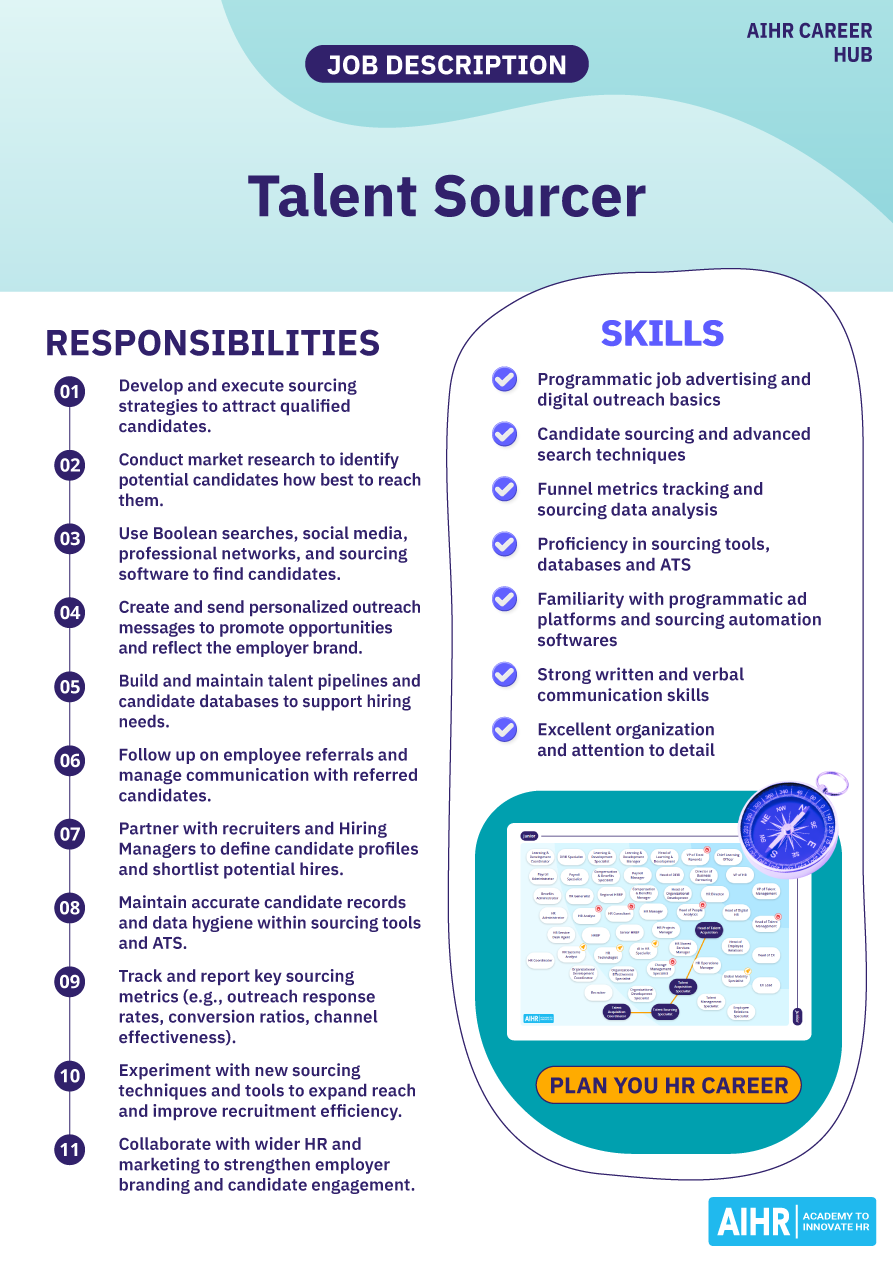
Qualifications for a Talent Sourcer role
To succeed as a Talent Sourcer, candidates need a strong mix of research capability, communication skills, and recruitment knowledge. Here are the key qualifications you should have for the role:
Educational requirements
Here are the typical educational requirements for becoming a Talent Sourcer:
- Bachelor’s degree in HR, psychology, business administration, communications, or a related field
- Solid grounding in research methods, communication, and data management to identify, evaluate and track candidates effectively.
Recommended certifications
Although not mandatory, professional certifications can enhance credibility and accelerate your career progression in sourcing and talent acquisition. Commonly recognized certifications include:
- Sourcing & Recruitment Certificate Program: Teaches you to source and engage passive candidates, avoid mishires with effective screening, build an influential employer brand, and optimize the recruitment cycle with data analytics.
- Strategic Talent Acquisition Certificate Program: Helps you develop the comprehensive skill set you need to create and implement a talent acquisition strategy that aligns with and successfully supports business priorities.
- AIRS Certified Internet Recruiter (CIR): Offers repeatable workflows and templates that help you find hard-to-reach talent, brief hiring managers with solid market intel, and standardize your process with a recognized credential.
- SocialTalent Black Belt in Internet Recruitment: Teaches you to sharpen messaging, run simple, measurable nurture workflows, and use metrics to double down on the channels that deliver.
Work experience
Although exact requirements vary per organization and industry, here is the experience you’ll generally need to be considered for a Talent Sourcer position:
- Typically 1+ year in sourcing, recruiting, or a related TA role
- Technical or executive sourcer roles often expect deeper domain knowledge and targeted search expertise.
Master talent sourcing to support business success
To ensure efficient talent sourcing that shortens time to hire and drives retention, you must define required skills, run multichannel searches, personalize outreach, maintain talent pipelines, and track response to hire metrics.
✅ Learn how to develop an effective end-to-end recruitment process
✅ Build relevant, accurate candidate personas to enhance your sourcing process
✅ Master Boolean search to effectively source across different search engines
✅ Set employer branding goals & identify the resources needed to achieve them
🎓 Advance your HR career with the flexible, online Sourcing & Recruitment Certificate Program.
Skills and competencies for a Talent Sourcer role
Below are the specific skills and competencies expected of a Talent Sourcer:
Role-specific skills
- Candidate sourcing across multiple channels using advanced search techniques such as Boolean logic
- Programmatic job advertising and digital outreach basics
- Ability to write engaging, brand-aligned outreach messages to attract passive candidates
- Ability to build and maintain talent pools and follow up on employee referrals
- Funnel metrics tracking and sourcing data analysis to improve performance and conversion rates.
Technical skills
- Proficiency in sourcing tools, databases, and ATS
- Familiarity with programmatic advertising platforms and sourcing automation software
- Experience using CRM systems and talent mapping tools to manage and segment candidates
- Data tracking and basic analytics for measuring KPIs
- Ability to generate reports and insights to guide sourcing optimization.
Soft skills
- Strong written and verbal communication skills
- Persuasive, sales-oriented approach to outreach
- Proactive, self-directed, and collaborative mindset when partnering with recruiters and hiring managers
- Excellent organization and attention to detail when managing multiple searches and follow-ups
- Fast, sound decision-making in a dynamic recruitment environment
- Adaptability and resilience when shifting priorities or exploring new sourcing methods.
Average Talent Sourcer salary
Talent Sourcer salaries vary widely depending on experience, industry, company size, and geographic location. Salary.com reports the average annual salary for a Talent Sourcer as $73,040. Glassdoor lists an average base pay of $88,000 per year, with most salaries falling between $70,000 and $110,000.
Robert Half, on the other hand, reports a slightly lower average range between $53,000 and $69,000, reflecting variability across industries and organization sizes. Meanwhile, Comparably places the national average higher, at $93,916, noting that Talent Sourcers in high-demand markets can earn up to $185,426 a year, nearly double the national average.
Potential career path for a Talent Sourcer
A typical career path for a Talent Sourcer starts in a Talent Acquisition Coordinator role, where you learn recruiting operations, candidate communication, and ATS basics. You can then move into a Talent Sourcer or Sourcing Specialist role focused on market research, proactive search, and outreach.
You may then progress into a Talent Acquisition Specialist or Recruiter position to run full-cycle hiring. With experience, you can become a Senior sourcer or TA lead, owning critical pipelines, mentoring others, and partnering closely with business leaders.
From there, you can advance to Head of Talent Acquisition, setting strategy, leading teams, and aligning hiring with workforce plans. You can also make lateral moves into technical or executive sourcing, employer branding, HR business partnering, or organizational development, depending on your strengths and interests.
You can use AIHR’s HR Career Map or more detailed information to help you plan your career path.
AIHR certificate programs to consider
AIHR offers two online, self-paced certificate programs to help Talent Sourcers strengthen their skill set.
Sourcing & Recruitment Certificate Program
The Sourcing & Recruitment Certificate Program provides practical, hands-on training in sourcing techniques, candidate engagement, and recruitment strategy. It teaches you how to identify both active and passive talent, use Boolean and AI-powered tools effectively, build strong candidate pipelines, and use effective messaging to attract top candidates.
Strategic Talent Acquisition Certificate Program
The Strategic Talent Acquisition Certificate Program focuses on aligning recruitment activities with long-term business objectives, developing sustainable sourcing strategies, and leveraging data to inform hiring decisions. You’ll also learn how to collaborate with business leaders and enhance candidate experience as a driver of employer reputation.
Next steps
Start with the fundamentals: sharpen your search techniques, write outreach that gets replies, keep your ATS/CRM clean, and track simple funnel metrics (response, qualified, conversion). Build and nurture pipelines for your priority roles, so recruiters have “day-one” shortlists when hiring kicks off.
Then, step up to strategy. Connect sourcing to workforce plans and skills gaps, partner closely with hiring managers, and strengthen employer brand touchpoints in your messaging. Additionally, use programs like AIHR’s Sourcing & Recruitment and Strategic Talent Acquisition to prepare you for senior TA roles.


